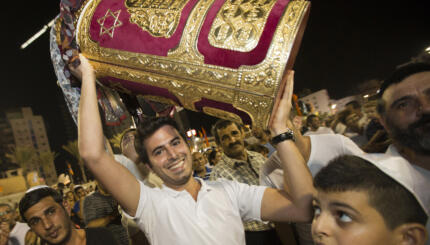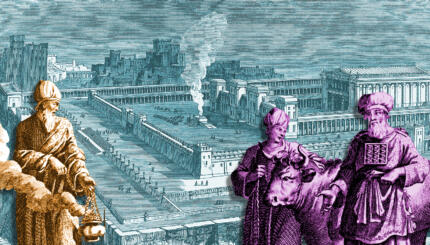Jewish tradition is not clear on how much God said during the revelation at Mount Sinai. Some sources are minimalist; these hold that God spoke only the Ten Commandments, or even just the first word of the Ten Commandments. Other traditions are more expansive; these believe that God recited the entire she’bikhtav, i.e., the written Torah, the Five Books of Moses, or even more expansively, that God revealed the Torah she’b’al peh, meaning all of the Bible and the (the first post-Biblical document of Jewish legal theory), as well as all of the commentary upon those works. Except for that last, most expansive approach, one must imagine that God began a conversation on Sinai. The Jewish people, in God’s image, responded, and Conversational Torah, as it could well be called, has never ceased growing and spreading, recorded over the centuries in countless volumes of Jewish texts.
The conversation might be seen as a little lopsided. God’s one utterance seems to have provided the Jews with enough to respond to for millennia. Why is this? Ironically, the core of Israel’s side of the conversation is the assumption that the Torah is perfect and complete. One might think that if God’s words were perfect and complete, what would be left for Israel to say? Along these lines, the Jerusalem
(the Yerushalmi) reports, “Even that which an experienced student might someday teach in front of his teacher was already stated to Moses at Sinai” (Peah 13a). What must it feel like to study and study and know that one’s most creative contribution is only the rediscovery of that which was already revealed? And when one unknowingly repeats the comment of an earlier sage, one is to recite a blessing for having merited to think along the same lines.
The reality of the Torah (and the Bible, the Mishnah, and all other Jewish texts), however, is that the texts have (apparent) gaps and contradictions, especially when one is forced to consider all of the texts simultaneously as part of the one, complete, perfect revelation given to Moses on Sinai. Issues of ritual or civil law might be repeated in different parts of the Torah, with or without variations in the details; both present a problem for the rabbinic mind. If Torah is perfect, then there is no need for repetition. If Torah is perfect, there can be no contradictions. Consequently, the rabbis developed the midrashic model of interpretation, which assumes that those same rough spots in the text–the repetitions, the contradictions–are part of an elaborate coding that God put into the text so that we could learn additional information. One part of the text could illuminate the meaning of an apparently distinct part of the text. Or seemingly extra words are included in order to teach additional details of the law’s application or aspects of the narrative. In Genesis, Joseph’s brothers cast the arrogant, young Joseph into “an empty pit, it had no water,” the Torah relates. If the pit was empty, it obviously had no water, so why add that “superfluous” detail? To teach that the pit did have scorpions in it! (Genesis Rabbah 84:16).
At the same time, rabbinic legends show an awareness that the content of the Conversational Torah has grown and developed. Rabbis were (and are) intellectuals who were aware of their own innovations and contributions. But the “rules” of the interpretive, midrashic “game” required this assumption that the Torah was perfect and complete, so how did they understand their own creativity? It is not entirely clear. One response, however, was that the details of the Conversational Torah were perceived as lost, and that the rabbinic interpretation of scripture is restorative. Song of Songs Rabbah describes this beautifully:
“Your neck [is adorned with] a linked/beaded necklace.” When [the sages] link words of Torah to the Prophets and from the Prophets to the Writings, and the fire flashes around them, then the words [themselves] are as happy as they were when they were given on Sinai” (Song of Songs Rabbah 1:53).
As each generation of Jews engages the previous generations, adding commentary and “restoring” the connections that God intended, more and more of God’s will is revealed, providing new occasions and new opportunities for the next generation to join the conversation.

Help us keep Jewish knowledge accessible to millions of people around the world.
Your donation to My Jewish Learning fuels endless journeys of Jewish discovery. With your help, My Jewish Learning can continue to provide nonstop opportunities for learning, connection and growth.


